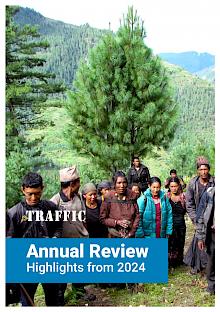
OFFERING A NEW WAY FORWARD
Trade is one of the oldest and most foundational of human behaviours. We are piloting and highlighting examples of how legal and sustainable trade itself can protect biodiversity, whilst also providing livelihoods for local communities and income for governments.
Throughout 2024, we've put our experience into action, partnering at local, national, and international levels, as well as with private companies and consumer groups, to inspire and leverage real change. Below are some examples of this in action. For more highlights, take a look at our 2024 Annual Review report.
As a child, Ramila never learnt to read or write. But she was determined that her children would be educated, and thanks to her work picking wild medicinal plants in the high Himalayas, all of her children have attended high school.
Ramila’s story is intertwined with the efforts of TRAFFIC and its local partner, the Asia Network for Sustainable Agriculture and Bioresources (ANSAB), which are working to strengthen sustainable harvesting practices in Nepal, and support the local harvesters and communities that rely on high-value medicinal plants.
Find out more about our ‘Scaling-up Conservation of Himalayan Plants and Fungi through Sustainable Trade’ project and watch our associated film.
Forests are the most biodiverse ecosystems on land, home to 80% of terrestrial species. We depend on them for the health of our planet and our own survival and wellbeing. Yet they face threats on numerous fronts, not least forest crime, which Interpol estimates is worth between US$51-152 billion per year.
TimberStats - pinpointing illegal trade routes: This unique platform enables law enforcement officials and governments to pinpoint trade routes where illegal activity is likely to be taking place. It encompasses data from UN Comtrade, the world’s most comprehensive global trade data, on 77 countries in South America, sub-Saharan Africa and Southeast Asia.
Timber Tracker - revolutionising legal african timber trade: TRAFFIC has previously piloted Timber Tracker in Tanzania, where it has been taken up by Tanzania Forest Services and built into a sophisticated computerised licensing and monitoring system called FREMIS. Since the introduction of Timber Tracker, revenue from timber has increased by around 50%, as illegal timber trade is stamped out, and local traders see the benefits of easy, transparent, and speedy processes.
TRAFFIC’s project, Reducing Trade Threats to Africa’s wild species and ecosystems (ReTTA), works to identify trends in illegal or unsustainable trade and helps develop national and international solutions that could turn the tide for wildlife.
3D-printed Shark Fins: TRAFFIC’s 3D replica shark fins continue to help easily identify shark fins from CITES listed shark species: the freely-available files to recreate and print sets of fins have been downloaded by government agencies, universities, museums and private tech companies 185 times.
The Wildlife Trade Portal: Access to information on wildlife trade underpins successful interventions in reducing threats from illegal and unsustainable trade in wild species. Over the last year use of the Portal has seen remarkable growth, with 900 new users.
Online Cheetah trade: A TRAFFIC report covering the online trade in live cheetahs stimulated important discussions at the inaugural Cheetah Summit in Ethiopia. The Summit culminated in the signing of the Addis Ababa Declaration for Global Cheetah Conservation.
In 2020, Tanzania pioneered new Game Meat Selling Regulations (GMSR) - a bold approach to tackle poaching and illegal trade while improving food security, supporting community based conservation and economic opportunities. Detailed research published by TRAFFIC set out findings and recommendations from across the wild meat supply chain to help the GMSR meet the needs of Tanzania’s population and wild species.
To keep consumers safe from potentially contaminated products, TRAFFIC amended Tanzania’s Meat Inspection Regulations in collaboration with the Ministry of Livestock and Fisheries to ensure food safety protocols and inspection mechanisms are embedded within the GMSR following research conducted in collaboration with Tanzania’s Veterinary Association discovered multiple zoonotic pathogens present among wild meat samples.
Once further recoemmendations are applied, there is great potential for the GMSR to demonstrate how Target 5 of the GBF can be met through following a One Health approach.
An initiative with kindness and respect for all life at its heart has reached thousands in the Traditional Chinese Medicine (TCM) community in Malaysia, urging practitioners, traders, and consumers to avoid using ingredients from endangered or protected wildlife, such as bear bile or Saiga horn.
In May 2024, more than 100 key industry players attended a TCM conference organised by TRAFFIC to promote legal practices and sustainable ingredient use. 94% of attendees gave positive feedback about the conference, finding content relevant to their work.
TRAFFIC is developing similar work in China and Viet Nam, organising meetings between TCM practitioners and pharmaceutical firms to explore collaboration and advocate for global TCM sustainability policies.



